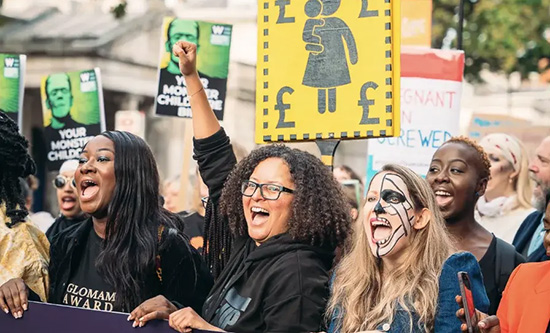
Britain has the second most expensive childcare system in the world and the second lowest investment into childcare in the OECD. With the ever-growing costs, privatisation, and slashing of state support, parents face impossible decisions and increasing numbers of women are being forced to stay at home to look after children.
A parent in full-time work requires around 50 hours of childcare per week. If their child is younger than three, the average cost per child is £1,060 a month. If their child is three- to-four, parents can access 15-30 hours a week of childcare from providers supported by government subsidies. Already immensely short of what is required, this covers just 38 weeks of the year and a lack of government providers means parents are waiting months to get a place with an approved provider. For primary school aged children, childcare during the six-week summer holiday costs parents an average of almost £900 per child. Factor in the cost of housing, bills, food and travel, and paying for childcare becomes simply impossible for growing numbers of parents.
The extremely limited state support for parents on Universal Credit requires them to pay hundreds of pounds up front to providers with the possibility to claim up to 85% of it back at a later date. Sure Start Centres, which were a lifeline to poor and working class parents, have been decimated by government cuts. Centres in the 30% most disadvantaged areas would provide childcare for at least ten hours a day, five days a week for 48 weeks of the year. In 2009/10 there were 3,600 Centres across the country. Since then, successive governments have closed down more than one third.
Single parents, 90% of whom are women, used to be able to claim child income support until their youngest child was 16. Changes introduced under the 2008 Labour government, and extended by subsequent Tory governments, now mean single parents can only claim child income support until their youngest child is one, after which they must show they are preparing to go back to work to continue receiving any support. Since 2010 the number of single parents living in poverty has jumped from 40% to 50%.
Early Years Alliance found that since 2017, childcare subsidies have been underfunded by £1.7bn. There is an 8% real term fall in funding for 2024-25. Other OECD countries, including Germany, France and Denmark, are able to offer much more affordable childcare than Britain: in Germany children have a legal right to childcare with prices starting from £61 to £130 a month per child (The Guardian 18 October).
In 2021 the TUC found that one in three parents in Britain are spending more than a third of their wages on childcare. Since then, the cost of childcare has risen a further 2% to 3.5%. A recent survey of 27,000 parents of young children, conducted by Pregnant Then Screwed and Mumsnet, found that for 62% of respondents the cost of childcare is now the same or more than their rent or mortgage. This rises to 73% for single parents and for parents in full time work.
As the report highlights, ‘high childcare costs are a key driver for women being pushed into low-paid part-time work’. 43% of mothers said that the cost of childcare has made them consider leaving their job and 40% said they have had to work fewer hours than they would like because of childcare costs. Unaffordable childcare and nursery closures are attacks on women. In times of crisis, women’s and children’s services are some of the first to be axed, with the expectation women will take them on as individualised, privatised toil within the home. During the pandemic, mothers were one and a half times more likely to lose their jobs, quit or be furloughed than fathers.
The Labour Party have said their promise to increase the number of state-run nurseries to lower prices is dependent on the ‘economic mess’ left by the Tories. In other words, Labour will continue to carry out savage cuts and underfund crucial services such as childcare, as required by British capitalism. Capitalism has no interest in ensuring women are part of social and political life, unless it is an economic or political necessity.
Socialist Cuba provides an example of an alternative system that prioritises women’s rights and wellbeing. The newly passed Family Code (see p10) sets out ‘to enhance gender equality within the family and strengthen shared responsibly for domestic work and childcare’. Cuban parents can access a completely free nursery school, Círculo Infantil, between the ages of six weeks and six years. Cuban women, encouraged to live life outside of the home, now make up more than half of the General Assembly and dominate the engineering and healthcare sectors.
This is only possible under a socialist system, with a centrally planned economy and the political will to prioritise social need rather than profit. In Britain, the government plans to address the childcare crisis by further deregulating the industry through an increase in the ratio of children to adult supervisors. This puts more pressure on workers without adequate support or training. Nursery workers, 97% of whom are women, already receive poverty pay for exhausting hours and high intensity work. We must demand decent, accessible and affordable childcare for all, alongside opposing cuts to wages, benefits and reproductive services. Working class women must fight back.
Ria Aibhilin and Annie O’Connor
FIGHT RACISM! FIGHT IMPERIALISM! 291 December 2022 /January 2023




